
BSc, MSc, PhD
Personal Chair
- About
-
- Email Address
- b.e.scott@abdn.ac.uk
- Telephone Number
- +44 (0)1224 273257
- Office Address
Room 412 Zoology School of Biological Sciences University of Aberdeen Tillydrone Ave Aberdeen, AB24 2TZ
- School/Department
- School of Biological Sciences
Tidal Energy
@DWPlanetA Video asking why we are not using more Tidal Power for our energy needs
Memberships and Affiliations
- Internal Memberships
-
- CURRENT
- University of Aberdeen representative on MASTS Executive Board 2022- present
- School of Biological Sciences (SBS) Executive and Line Management Duties 2019- Present
- PAST
- Centre of Energy Transition: Renewable Generation Champion 2020- 2022
- SBS EDI Committee 2019- 2022
- Mentoring Champion SBS 2018-2022
- Athena Swan SBS committee -2016-2022
- Marine Research Collaboration Forum (MarCRF) Chairperson 2012-2016
- Member for Management Group of Environmental Food Security Theme 2012-2016
- Member of the Steering Group of the Energy Theme 2012-2016
- Senatus Academicus - Elected Member Sept 2013-2015
- Athena Swan College working group 2012-2014
- External Memberships
-
- CURRENT
- UKERC Advisory Board
- Co-Director, Offshore Renewable Energy (ORE) SuperGen Hub
- Member of Scottish Government Offshore Renewables Research (ScotMER) group,
- Scientific Advisory Expert Panel for NatureScot 2021- ongoing
- Programme Advisory Group for the NERC ECOWind 2022- ongoing
- European Marine Board Working Group on Marine Renewable Energy
- Scottish Biodiversity Programme Advisory Group – Scottish Government
- Programme Advisory Group for the NERC INSITE programme
- PAST
- Forum Convenor of the Marine Alliance for Science and Technology Scotland (MASTS), Marine Renewable Energy Forum. Marine Renewable Energy Forum
- Member of the Ministerial DEFRA Science Advisory Panel to assist the work of selecting Marine Conservation Zones in England and Wales.
- Scientific Advisory Committee of Scottish Natural Heritage
- Member of Marine Ecosystems Working Group, NERC.
Latest Publications
Propagating uncertainty from physical and biogeochemical drivers through to top predators in dynamic Bayesian ecosystem models improves predictions
Ecological Informatics, vol. 92, 103510Contributions to Journals: ArticlesDoes the oceanographic response to wind farm wind-wakes affect the spring phytoplankton bloom?
Progress in Oceanography, vol. 237, 103512Contributions to Journals: ArticlesEcological impacts of floating offshore wind on marine mammals and associated trophic interactions: current evidence and knowledge gaps
Marine Pollution Bulletin, vol. 218, 118059Contributions to Journals: ArticlesFishing, Offshore Wind Energy, Climate Change and Marine Spatial Planning: Is it possible to plan for a best use of space?
Ecological Solutions and Evidence, vol. 6, no. 2, e70039Contributions to Journals: ArticlesSpatial conflict in offshore wind farms: Challenges and solutions for the commercial fishing industry
Energy Policy, vol. 200, 114555Contributions to Journals: Articles
- Research
-
Research Overview
I conduct multi-disciplinary research using my expertise in marine ecology, oceanography and fisheries sciences. My research identifies general rules in bio-physical oceanographic processes that lead to the creation of hotspots of predator-prey activity. Specifically, my research group defines biological and physical variables that provide the limited, patchy locations and conditions where trophic energy is transferred across trophic levels in marine food webs.
My research team using approaches ranging from the collection and use of fine scale (second by second) information throughout the water column from as well as the analysis of large scale (100s or km) long term data sets on spatial population dynamics. Both scales of information are used within simulation modelling methods which are agent based.
Research Areas

Research Specialisms
- Biodiversity Conservation
- Climate Change
- Ecology
- Environmental Risk
- Marine Sciences
Our research specialisms are based on the Higher Education Classification of Subjects (HECoS) which is HESA open data, published under the Creative Commons Attribution 4.0 International licence.
Current Research
PELAgIO: Physics-to-Ecosystem Level Assessment of Impacts of Offshore Windfarms (NERC, TCE, Defra) 2022-2025. PELAgIO will support development of evidence-based policy and marine management through interdisciplinary research that explores the consequences of offshore wind development on marine environments, marine wildlife, and wider ecosystem structures. By observing and modelling over a range of physical and biological scales, using a combination of autonomous platforms, ocean robots, research vessels and satellite observations, PELAgIO will build an ecosystem-level understanding of projected changes
EcoNex: The Marine Energy, Biodiversity and Food Nexus (UKERC) 2022-2024. The UK is current global leader in offshore wind, committed to increase capacity to 50 GW by 2030. Therefore, there is a drive to dramatically cut the approval times from four years to one year. To do this sustainably requires an understanding on the nexus of trade-offs between climate change and multiple uses of marine natural resources (energy extraction, fisheries, and marine protected areas). This project, working with renewable, fishing industries and policy bodies, will enable evidence-based decision making to balance environmental, social, and economic impacts and ensure marine net gain.
PREDICT: Predicting seasonal movement of marine top predators using fish migration routes and autonomous platforms. 2021-2024. PREDICT is an ambitious three-year project funded by Ørsted, the global leader in offshore wind, and a collaboration between the University of Aberdeen and Environmental Research Institute (ERI) at the University of the Highlands and Islands that aims to address knowledge gaps in offshore wind environmental characterisation by improving understanding of fish migration patterns and providing a vision for next-generation monitoring techniques.
MSCA-RIBES: RIver flow regulation, fish BEhaviour and Status (EU 2020-23) RIBES European Training Network (ETN) training 15 ESRs in the interdisciplinary field of eco-hydraulics to find innovative solutions for freshwater fish protection and river continuity restoration in anthropogenically (especially renewable extraction) altered rivers.
EPSRC Supergen Offshore Renewable Energy (ORE) Hub.
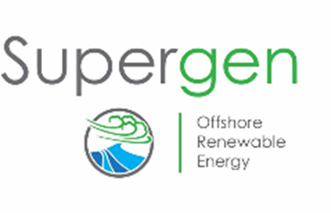
Past Research
VertIBase - Supporting evidence-based decision-making on marine vertebrate interactions with wave and tidal energy. NERC KE (2016-18)
Marine Growth Analysis on Decommissioning Offshore Installations: NERC Oil & Gas Decommissioning Innovation. (2016-17) Applying CoralNet to survey footage from offshore platforms on the UKCS and training software to identify the main marine growth species on UKCS platforms and to calculate their percentage cover.
CORPORATES: NERC Biodiversity & Ecosystem Service Sustainability (BESS) 2014-16 Cooperative Participatory Evaluation of Renewable Technologies on Ecosystem services with SAMS, MSS and JHI. Exchanging knowledge between Marine Renewable Energy Industry, ecosystem service experts, planning and regulatory functions of Government to co-develop a Marine Spatial Planning decision-support system.
Knowledge Transfer Partnership with MeyGen www.meygen.com (2015-17)The KTP will apply the knowledge, techniques and expertise for environmental monitoring around tidal turbines to the MeyGen project.
EcoWATT 2050 EPSRC (2014-2017) Impacts of Very Large Scale Arrays and their Regulation
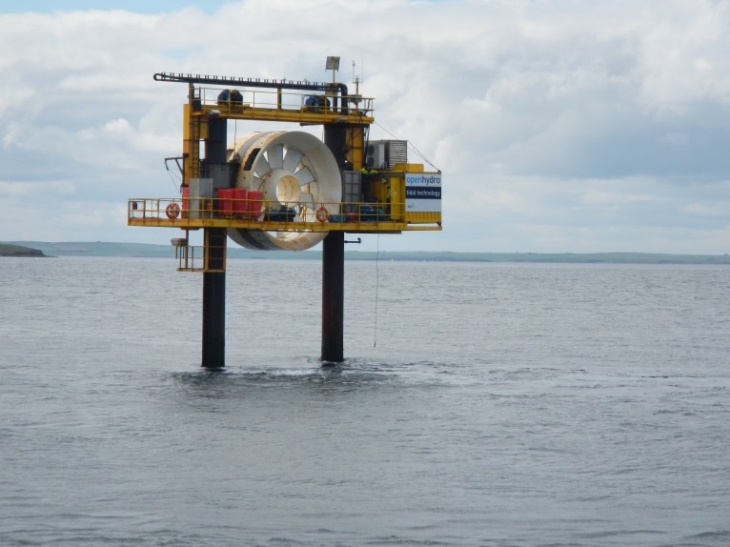
FORSITE: Modelling FORaging STrategies in high energy Environments. OPEN CASE NERC PhD studentship with CASE partners Royal Society for the Protection of Birds (RSPB) and Marine Scotland Science (MSS)
FLOWBEC NERC (2011-2014) FLOw, Water column & Benthic ECcology 4D
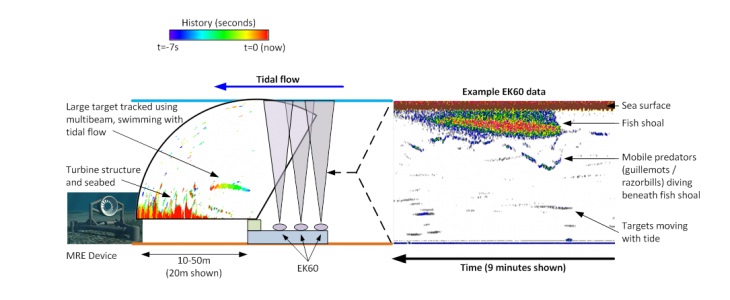
RESPONSE NERC (2011-2014) Understanding How Marine Renewable Device Operations Influences Fine Scale Habitat Use And Behaviour Of Marine Vertebrates
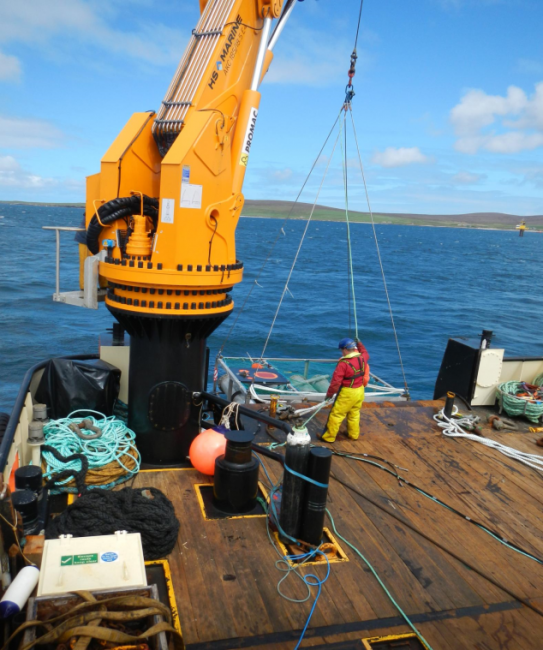
CMARHAB NERC (2008-2010): Critical Marine Habitat
Share the adventure of at-sea research on the James Cook see blog
Project lead by U of Aberdeen with POL, MSS, CEFAS, JNCC, Marine
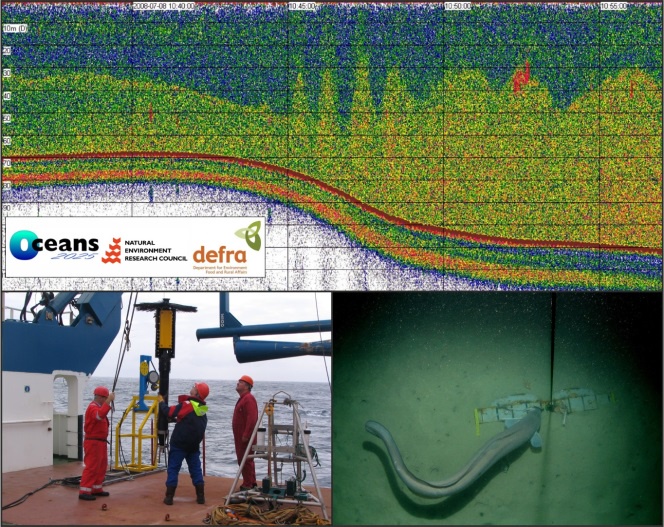
Resource Assessment Group and the Cornish Fish Producers Organisation. The success of the Ecosystem Approach, the sustainable use of fishing areas and the delineation of Marine Protected Areas (MPAs) all require a fundamental understanding of the mechanistic links between oceanographic properties, fish, top predators and fisheries activities. This requires multi-disciplinary, multi-trophic research to define critical marine habitats where multiple species of predators (including fishermen) are most likely to forage for their prey. This project tests two hypotheses concerning the underlying mechanistic forcing that may be occurring in newly identified areas with disproportionately high abundances of top predators (seabirds, marine mammals and fishing activity) and high levels of sub-surface chlorophyll.
PELAgIO: Physics-to-Ecosystem Level Assessment of Impacts of Offshore Windfarms (NERC)
Collaborations
- Prof Nicola Beaumont, PML
- Dr. Paul Bell, NOC, Proudman Oceanographic Laboratories
- Dr. Philippe Blondel, University of Bath
- Dr. Ian Davies, Marine Scotland Sciene (FRS Marine Lab Aberdeen)
- Dr Michela De Dominicis, NOC, Liverpool
- Prof Deborah Greaves, Plymouth
- Prof Matthew Palmer, PML
- Prof Jonathan Side, Heriot-Watt University
- Prof. Jonathan Sharples, NOC, Proudman Oceanographic Laboratories
- Prof. David Thompson, SMRU
- Dr. Ricardo Torres, PML
- Dr Vengatesan Venugopal, University of Edinburgh
- Dr. Tom Webb, University of Sheffield
- Dr. Benjamin Williamson, UHI, ERI
- Prof. Ben Wilson, SAMS
- Prof. Judith Wolf, NOC, Proudman Oceanographic Laboratories
Funding and Grants
- 2023-28 ORE SuperGen HUB: Offshore Renewable Energy SuperGen Hub. (EPSRC)
- 2022-25 PELAgIO: Physics-to-Ecosystem Level Assessment of Impacts of Offshore Windfarms (NERC, TCE, Defra)
- 2022-24 EcoNex: The Marine Energy, Biodiversity and Food Nexus(UKERC)
- 2021-24 PREDICT: Predicting seasonal movement of marine top predators using fish migration routes and autonomous platforms. Ørsted
- 2018-22 ORE SuperGen HUB: Offshore Renewable Energy SuperGen Hub. (EPSRC)
- 2019-23 SMEBA: Sustainable Marine Ecosystems and Offshore Energy: A Bayesian Modelling Approach. BEIS / HartleyAnderson
- 2018-22 PPCC: Modelling primary production in Scottish waters and the impact of large scale marine renewables and climate change. MASTS, MSS
- 2017-21 INDI-POP: Individuals to populations: The potential effects of large tidal arrays on mobile marine populations (Open NERC CASE)
- 2017-21 DEPTH: Determining the ecology and physics of tidal stream habitats. EMEC, SAMS/UHI, MSS
- 2016-18 Environmental Studies of the MeyGen Tidal Turbine Array: HartleyAnderson Contract
- 2016-18 VertIBase NERC KE - Supporting evidence-based decision-making on marine vertebrate interactions with wave and tidal energy.
- 2016-17 Marine Growth Analysis on Decommissioning Offshore Installations. NERC
- 2015-17 Knowledge Transfer Partnership (KTP - TSB) with MeyGen
- 2015 NERC Marine Renewable Energy KE Internship for Benjamin Williamson.
- 2014-16 NERC Biodiversity & Ecosystem Service Sustainability (BESS) grant entitled Cooperative Participatory Evaluation of Renewable Technologies on Ecosystem services (CORPORATES) with SAMS, MSS and JHI.
- 2014-17 EcoWatt 2050 EPSRC Consortium of Universities of Heriot-Watt, Edinburgh, UHI, Strathclyde, Swansea, St Andrews, NERC and MSS
- 2014-15 Tansley Workshop: Planet Earth-Planet Ocean, Work of John Steele, joint with Tom Webb
- 2013-17 NERC CASE PhD Modelling Foraging Strategies in High Energy Environments (FORSITE) CASE partner is Marine Scotland Science.
- 2011-14 NERC Marine Renewables, Flow, Water Column and Benthic Ecology 4D (FLOWBEC). Consortium grant with NOC Liverpool, Uni. Bath, Uni. Edinburgh, Uni. Plymouth & PML, Uni. Exeter and Queens Uni. Belfast.
- 2011-14 NERC Marine Renewables, Understanding how Marine Renewable device operation influences habitat use and behaviour of Marine Vertebrates (RESPONSE). Consortium grant with SMRU, Uni. St Andrews, Uni. Loughborough, Uni. Edinburgh, Uni. Cranfield.
- 2008-14 Scottish Natural Heritage (SNH) 'Potential Ecological Impact of a Small Scale Tidal Renewable Device on the Isle of May'.
- 2008-10 NERC Sustainable Marine Bio-Resources (SMB) Grant 'Do oceanographic characteristics and predator-prey behaviours define critical marine habitats?' (CMarHab).
- 2007-08 Scottish Executive & FRS Grant 'Impact of temperature on overwinter condition and reproductive potential of sandeel'
- 2005-06 SHEFC Knowledge Transfer Grant 'Sensitivity of ecosystems to tidal renewable energy extraction'
- Teaching
-
Teaching Responsibilities
LEVEL 5 (MSc) www.abdn.ac.uk/study/courses/postgraduate/taught/fish/
Programme Coordinator MSc in Applied Marine and Fisheries Ecology (AMFE): Concepts and Practices for Ecosystem-based Management from 2008-2014
Course Coordinator for 2 of following courses within MSc AMFE:
- ZO5012 Marine and Fisheries Ecology, Conservation and Management
- ZO5518 Marine Spatial Management
LEVEL 5 Post-Grad Lecturing in:
- Z05304 Population Ecology
- EV551 Spatial Information Analysis
LEVEL 2-4 Undergraduate Lecturing in:
- SBS Honours Essays and Projects
- BI25Z2 Ocean Biology
- Z03305 Animal Population Ecology
Non-course Teaching Responsibilities
Personal Tutor to 18 UG students
- Publications
-
Page 1 of 12 Results 1 to 10 of 119
Propagating uncertainty from physical and biogeochemical drivers through to top predators in dynamic Bayesian ecosystem models improves predictions
Ecological Informatics, vol. 92, 103510Contributions to Journals: ArticlesDoes the oceanographic response to wind farm wind-wakes affect the spring phytoplankton bloom?
Progress in Oceanography, vol. 237, 103512Contributions to Journals: ArticlesEcological impacts of floating offshore wind on marine mammals and associated trophic interactions: current evidence and knowledge gaps
Marine Pollution Bulletin, vol. 218, 118059Contributions to Journals: ArticlesFishing, Offshore Wind Energy, Climate Change and Marine Spatial Planning: Is it possible to plan for a best use of space?
Ecological Solutions and Evidence, vol. 6, no. 2, e70039Contributions to Journals: ArticlesSpatial conflict in offshore wind farms: Challenges and solutions for the commercial fishing industry
Energy Policy, vol. 200, 114555Contributions to Journals: ArticlesA paradigm for understanding whole ecosystem effects of offshore wind farms in shelf seas
ICES Journal of Marine Science, vol. 82, no. 3, fsad194Contributions to Journals: ArticlesAn experimental methodology for automated detection of surface turbulence features in tidal stream environments
Sensors, vol. 24, no. 19, 6170Contributions to Journals: Articles- [ONLINE] DOI: https://doi.org/10.3390/s24196170
- [OPEN ACCESS] http://aura.abdn.ac.uk/bitstreams/dea6daf5-43da-442e-aa62-b5ab70ff0c6a/download
Using a Baited Imaging Sonar (BISON) to quantify the density, size, and detection range of fishes in a shallow, nearshore habitat
Limnology and oceanography-Methods, vol. 22, no. 9, pp. 634-646Contributions to Journals: Articles- [ONLINE] https://zenodo.org/records/10354912
- [ONLINE] DOI: https://doi.org/10.1002/lom3.10636
- [OPEN ACCESS] http://aura.abdn.ac.uk/bitstreams/bcc4a52b-8701-4442-9dc7-0b3b8a52803a/download
Integrated survey methodologies provide process-driven framework for marine renewable energy environmental impact assessment
Marine Environmental Research, vol. 198, 106532Contributions to Journals: ArticlesHydrodynamics of Fish-Shaped Rigid Bodies: Velocity-Drag Coupling
Advances in Hydraulic Research: 40th International School of Hydraulics conference proceedings. Springer, pp. 55-66, 12 pagesChapters in Books, Reports and Conference Proceedings: Chapters- [ONLINE] DOI: https://doi.org/10.1007/978-3-031-56093-4_5
- [ONLINE] View publication in Scopus
